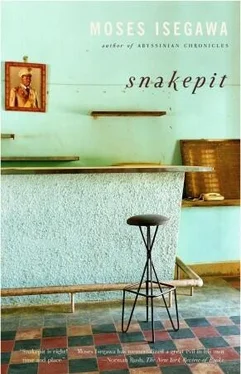The reception turned out to be as disorganized as the hairs on the old man’s head. He never got the chance to talk to the group properly; neither did he wish to. He would leave the details to Bat, if it came to that. To kill time he nursed a drink, talked to a colleague or two and was relieved when the Marshal asked for silence and made a clumsy speech. The only noteworthy point was the invitation to a cocktail party in two days’ time, which he extended to everybody. It was to take place at Paradise Villas, a presidential resort somewhere on the shores of Lake Victoria. He knew that there was momentous news in the offing because Marshal Amin used the place exclusively for special occasions. Later he heard that ambassadors and other dignitaries had also been invited. The next day a spy in the Ministry of Foreign Affairs informed him that the delegation had left for home.
On the big day, around one hundred dignitaries attended the function. The West Africans stood out in their colourful, stylish garb, which resembled very voluminous cassocks or billowing nighties. The rest wore tuxedos, safari suits and gowns. There was a profound air of prosperity; every hair seemed to be in its proper place; every shoe polished to a high shine. Heavy watches glinted on hairy wrists, women’s jewellery flashed and winked ad lib. An undercurrent of expensive perfume wafted in the air, accompanied by classy modulated laughter. General Bazooka was proud to be among these people, feeling like a child at a big wedding feast full of music and goodies. Such moments made the bothers of staying in power worthwhile. He looked at his gold-plated Oris Autocrat and smiled with satisfaction as it reminded him of the path he had travelled to get here.
Today was a special occasion, and his mother had agreed to come along. Normally, she kept away from government functions. In her old age all she wanted was a quiet contented life. She felt grateful for the prosperity that had come her and her son’s way. The General had given her a business in Jinja. She imported and sold fish nets and money was rolling in. He had also built her a villa in Arua, and her family took care of it for her. Once a month he visited her and she cooked his favourite meal, millet bread with fish, and they reminisced, laughed and enjoyed their good fortune. “Do you now and then think about the leeches and the snakes in the swamps where you used to cut papyrus reeds?” he would ask with a faint smile on the corners of his mouth. “Every day, every day, my son. I am so happy it is all in the past. If only your father were here. .” Sometimes he brought the children along, because he wanted them to have a close relationship with their grandmother.
As a rule, she never asked about his work. Sometimes he told her about what went on in the corridors of power, but she never fished for details, rumours. It seemed so petty, so unimportant. In the past she also never asked what her husband did or had done. Men did what they had to do to provide for their families, and the wives brought up the children the best way they could and tried to be good wives, kind, understanding, supportive, tolerant of their husbands’ weaknesses. Her only regret was that her husband had not lived to see his son in glory. Alcohol poisoning had claimed him. She now lived with another man, whom the General accused of exploiting her. She looked at her son in his beautiful uniform with the glittering medals, and they both smiled. She felt proud to have been invited, a fitting honour for a mother who had seen the General when he was still snot-nosed.
There were many generals and their wives who came from her region and spoke the same language. They treated her with the respect she deserved and listened to her with bowed heads and fixed smiles. She admired the well-dressed women; they reminded her of what she might have looked like had her beginning been so auspicious. What did it matter now? They all ate from the same table now. By the look of things, her son could only go higher. His was one of the best-performing ministries; the fight against smugglers was going well. The Russians had promised to give him ten more speedboats, which would ease the task of combing the lake of that lice. He had invited her, because he had heard from a presidential aide that the Marshal was about to promote a number of high-ranking officers. My son is going to become a full general, she said to herself. A full general before reaching forty!
The day could not have been better. The weather was fabulous, with a clear blue sky, mild sunshine and a slight wind that kept the heat down. The lake shimmered in the distance, little waves corrugating its surface, the horizon a faint brown line drawn across its extreme periphery. It changed from blue to grey to green as if somebody were pressing buttons from above. There was a boat race, a spectacle of coordination, timing and precision. Traditional dancers pranced and swayed to the music, their voices rising and falling in unison. Quick short speeches sped one after the other, as if everybody wanted to rush to the shattering climax.
Turned out in a spotless military uniform, Marshal Amin took the stage. He launched a tirade against the racist South African regime, the Americans, the British and the Israelis. On the home front, he slammed the military top brass for inefficiency, overindulgence, corruption. “I have found a miracle cure for those ills,” he said dramatically. From behind the marquee Robert Ashes emerged. Marshal Amin gave a sign, and the dignitaries began to clap.
Robert Ashes had had a haircut for the event, and the straggling hairs round his ears and the back of his head were now in line. He was dressed in a nice suit with shiny shoes and a red tie. He walked with the confident air of a man ready to go into action. Marshal Amin announced that he had put Ashes in charge of the Anti-Smuggling Unit, effective immediately. He hugged him, as if to emphasize his words.
General Bazooka could hardly believe his eyes or ears, and the obscene hug in front of him seemed to last for an hour. He did not know whether to howl, or hang his head in shame. He flew into a silent rage and his lower lip quivered. He wanted to kill the white man on the spot. How could the Marshal do this to him? Without as much as a warning! In front of his mother!
My home area, he said to himself, my beautiful islands, handed over on a plate to that snake! The whole of Jinja, the northern shores, my waterfalls and crocodiles too!
Marshal Amin later cornered him with his mother, introduced Ashes and ordered General Bazooka to show his successor the ropes. General Bazooka hated the white man’s smirk, his teeth, everything about him. He had no intentions of going anywhere near him, except if he was going to kill him, which he intended to do. He wanted Ashes’ tongue, eyes and penis in a jar. The last time he made a man smoke his penis had been in 1971; three years later Ashes was going to become the second. It would pacify the generals humiliated by his arrival and promotion, and he would reclaim mastery over the lake and his beautiful islands.
“You are still a cabinet minister,” his mother said in an effort to comfort him. “Don’t worry. Look on the bright side. Now you have time to concentrate on the ministry, your family and other duties.”
General Bazooka was too angry to answer.
ROBERT ASHES HAD originally come from the Industrial North-east, born in Newcastle, Great Britain. His father was a dissatisfied factory manager, his mother a gentle housewife. The only thing his father failed to dominate was his drinking and his temper. Everybody called him the Weatherman, agent of doom and gloom. There always seemed to be something wrong at the factory: strikes, unmet quotas, cash-flow problems, fewer orders. Home was just an extension of his office, and the ways which had taken him from the assembly line to the top, he espoused there. Ashes later learned that his father was not his biological father, and that the Weatherman was frustrated by his failure to have a son from his loins. By then, Ashes had decided to leave anyway; he had no intention of working in factories, mines or docks. He craved freedom, adventure, not bullying bosses and claustrophobia. Before leaving, he decided to put his parents out of their misery. The house went up in beautiful flames. His parents were injured but they survived. He hitch-hiked to London before anybody began to ask questions.
Читать дальше











